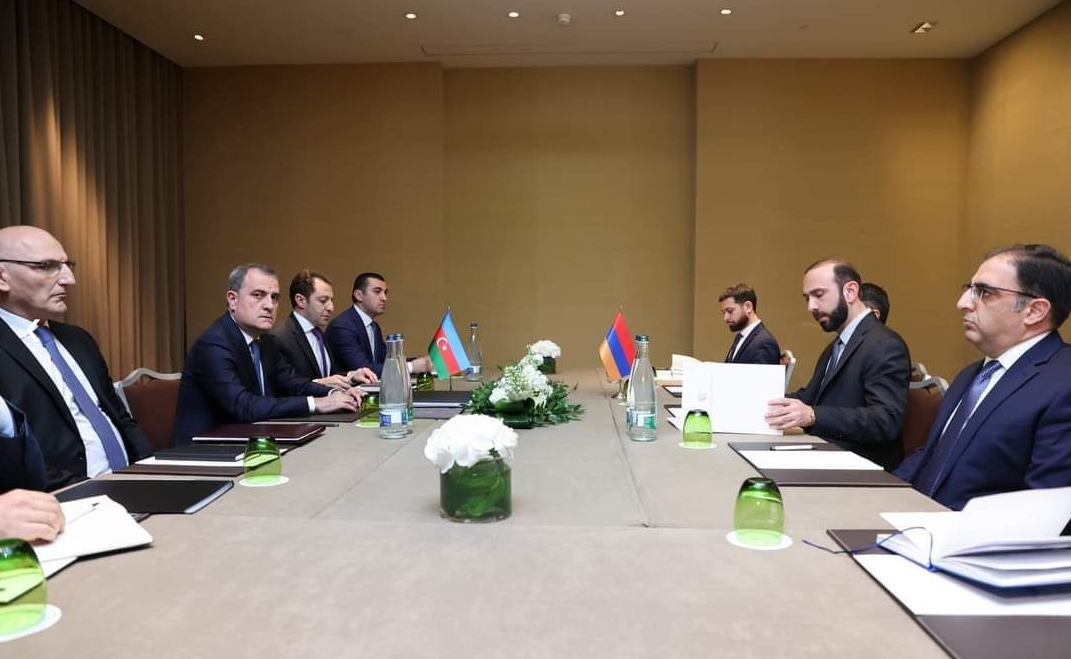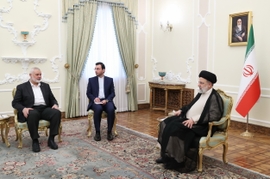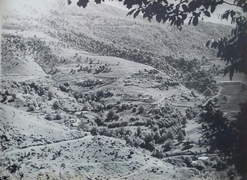The foreign ministers of Azerbaijan and Armenia discussed on Sunday the key points that could untie the knots on the long-awaited peace agreement between the two South Caucasus countries.
The bilateral meeting, which took place in Geneva, focused primarily on the normalization of ties, delimitation of the inter-state border, unblocking of communication links, and humanitarian issues.
“The importance of focusing efforts on the normalization of interstate relations between Azerbaijan and Armenia and the signing of a peace treaty in the post-conflict period was emphasized by [Azerbaijani] Minister Bayramov,” the Azerbaijani Foreign Ministry said in a statement.
“In this regard, Minister brought to the attention of the Armenian side the elements of the peace treaty based on the five principles proposed by Azerbaijan.”
Jeyhun Bayramov also highlighted the importance of full withdrawal of the Armenian armed units from the territories of Azerbaijan, the opening of transport and communication lines within the short period, and the need to make progress toward border delimitation, in accordance with the trilateral statements signed by the leaders of Azerbaijan, Armenia, and Russia, as well as the agreements reached between the leaders.
According to the ministry's statement, the Azerbaijani side took into account the recent tension on the undelimited border and proposed holding the next meeting of the bilateral commissions on delimitation in October of this year, instead of November as previously agreed.
On August 31, Azerbaijani and Armenian leaders met in Brussels under the mediation of European Council President Charles Michel to discuss key issues on the mutual agenda, including the peace treaty. During a post-meeting press briefing, Michel said that the two sides agreed to task foreign ministers to meet within one month for working on draft texts of the peace agreement.
Meanwhile, the issues related to the normalization of relations in the region are expected to come into the spotlight during the meeting between Turkish President Recep Tayyip Erdogan and Armenia’s Prime Minister Nikol Pashinyan in Prague on October 6-7. According to media reports, President Erdogan could also hold a meeting with his Azerbaijani counterpart Ilham Aliyev, while in Prague, and join a trilateral meeting as the next step.
Azerbaijan has been insisting on the signing of a peace treaty with Armenia to prevent any escalations between the two countries following the 2020 war.
In February 2022, Baku submitted a proposal containing five basic principles to Yerevan, which highlights the key issues related to the peace negotiations between the two countries, including the mutual recognition of territorial integrities and delimitation and demarcation of the state border. The border commissions from the two countries held meetings in May and August 2022 to negotiate the process of delimitation of the border, a larger portion of which remained out of Azerbaijan’s control for nearly three decades due to Armenian occupation.
The peace, however, remains fragile due to the numerous provocations of the Armenian military and illegal armed formations.
On the night of September 12 to 13, the Armenia-Azerbaijan borderline witnessed the most bloody clashes since the 2020 war, which erupted as a result of the large-scale provocation by the Armenian military. The retaliatory operations of the Armed Forces of Azerbaijan forced the Armenian military to retreat.
Armenia and Azerbaijan had been locked in a decades-old armed conflict over the latter’s Karabakh (Garabagh) region since the early 1990s after Armenia launched full-blown military aggression against Azerbaijan. The bloody war ended with a ceasefire in 1994 and saw Armenia occupying 20 percent of Azerbaijan’s internationally recognized territories. Over 30,000 Azerbaijanis were killed, 3,890 went missing, and one million others were expelled from their lands in a brutal ethnic cleansing policy carried out by Armenia.
On September 27, 2020, the Armenia-Azerbaijan conflict spiraled into the largest clashes since the First Karabakh War when Armenia’s forces deployed in the occupied Azerbaijani lands shelled military positions and civilian settlements of Azerbaijan. During the counter-attack operations that lasted 44 days, Azerbaijani forces liberated over 300 settlements, including the cities of Jabrayil, Fuzuli, Zangilan, Gubadli, and Shusha, from nearly 30-year-long illegal Armenian occupation. The war ended with the signing of a tripartite statement by Armenia, Azerbaijan, and Russia on November 10, 2020. Under the agreement, Armenia also returned the occupied Aghdam, Kalbajar, and Lachin districts to Azerbaijan.







 Iran's senior military leaders described the drone and missile attack on Israel on April 14 night as “successful".
Iran's senior military leaders described the drone and missile attack on Israel on April 14 night as “successful".
 Iran's President Ebrahim Raisi extended condolences to the Chairman of the Political Bureau of the Palestinian Hamas group, Ismail Haniyeh, followi...
Iran's President Ebrahim Raisi extended condolences to the Chairman of the Political Bureau of the Palestinian Hamas group, Ismail Haniyeh, followi...
 The number of evacuees from flooded areas in Kazakhstan has reached 97,852 people, including about 32,856 children since March 27.
The number of evacuees from flooded areas in Kazakhstan has reached 97,852 people, including about 32,856 children since March 27.



